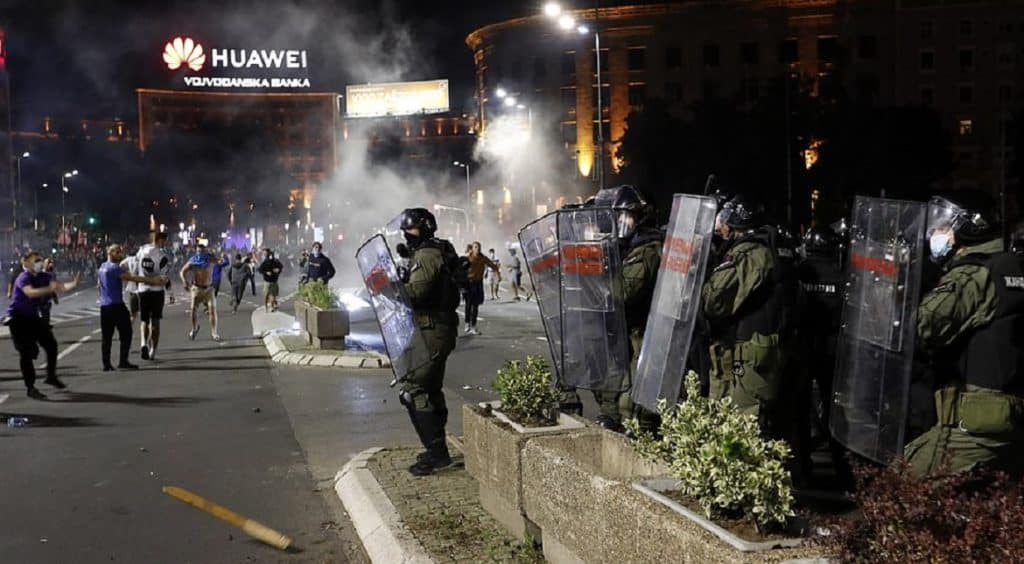By Slaviša Milačić
The protests that began in Serbia on July 7th came as a surprise to Serbian president Aleksandar Vucic as well as to many analysts.

The protests in Belgrade started spontaneously, just a few hours after the President of Serbia announced the tightening of measures to fight the epidemic of the Covid 19. The people simply got out to express their dissatisfaction in front of the National Assembly, informing each other through social media.
Organizing the elections in June, during the pandemic was not safe, but despite warnings, Serbia’s most powerful man, Aleksandar Vucic, decided to organize the elections. Shortly afterwards, a new wave of epidemics hit Serbia, but Serbian president decided that the people were to blame, and decided to punish them with a new imprisonment.
However, from the beginning of COVID 19, it was clear that the corrupt system could not cope with a serious health crisis. The entire public sector in Serbia was destroyed by the party administration. Drunk with omnipotence, Aleksandar Vucic did not notice that his system was being crowned.
Doctors from the crisis headquarters have been irreversibly compromised. After a series of scandals, especially with the falsification of data on the number of infected and deceased, no one believes them anymore.
Namely, the editor of a Serbian investigative news portal, Milorad Ivanovic, said that the officially released figures for coronavirus-related deaths is far below the number in the Public Health Institute’s data base. He stated that 1,080 people have been entered into the state-administered COVID-19 data base at the Batut Public Health Institute adding that BIRN reported 632 as the lowest number of deaths that its journalists determined were certainly coronavirus-related. The official figure for COVID-19 deaths released on Sunday by the Serbian Health Ministry is 311.
He said that the Public Health Institute, Health Insurance Fund (RFZO), Health Ministry and government had access to the data every day an hour before it was published on the Health Ministry’s COVID19.rs web site. He said that some of the doctors on the government’s pandemic Crisis Staff did not have access to the data base.
“The figures were lowered for some reason and there’s a pattern to who that was done. The Public Health Institute drafted a report for the government from the data base every day at 2:00 pm,” Ivanovic said.
Covid 19 only showed how corrupt and incompetent the system established by Aleksandar Vucic was and his media manipulations no longer help. However, that was only one of the reasons for the protests. The situation in Serbia is much more complex. In addition to the Covid 19, the main reason for Serbs to take to the streets is the issue of Kosovo.
Whether someone likes it or not, Kosovo is a basic political issue in Serbia. Not only because the interests of the great powers are concentrated in it. The religious and historical significance of Kosovo is immeasurable for Serbs and in addition, a significant number of Serbs still live in Kosovo. Plus Kosovo is rich in various mineral resources. It is probably no coincidence that the incursion into the Serbian Assembly was carried out by members of right-wing organizations. Their goal was to prevent Serbian president Aleksandar Vučić from making new concessions at the negotiations in Brussels.
However, instead of talking to the people, Aleksandar Vucic immediately went on the counterattack. He accused through his tabloids Russia for protests.
“Behind the violent protest in front of the Assembly of Serbia are anti-European forces that are close to the Russian right-wingers. This immediately became clear since the main leaders of the protest were the pro-Russian right-wingers – former Dveri member Srdjan Nogo, Dveri leader Bosko Obradovic, Mladjan Djordjevic from the Alliance for Serbia … And also, several Russians were seen at the rally, some of whom also spoke to the media.“
Such media headlines immediately provoked a reaction from Russia. The Russian Foreign Ministry stated on Thursday that information about Moscow’s involvement in riots in Belgrade and elsewhere was fake news.
“Some online media reported about an alleged ‘Russian mark’ behind the riots in Belgrade on July 7 and 8,” the Ministry said in a statement carried by the state Tass news agency.
It added that the authors of such ‘fake news’ continued with “well-known conspiracy stereotypes of their sponsors who “see Moscow’s hand” behind everything. “The only goal of those paid orders is to cast a shadow on Russian-Serb partnership,” the statement said.
The statement said Moscow hoped for a quick end to violence and establishment of order and stability in “friendly Serbia”, and for the resumption of political discussion about pressing issues in the state.
Despite everything, the main political consequence of demonstrations in Belgrade is that Aleksandar Vucic can no longer easily sign the so-called ” agreement on mutual recognition” with Kosovo. This will jeopardize his status as a strong man in Serbia, which will weaken his position with Western governments.
He received support from Germany and the United States because they believed that they could achieve their foreign policy goals in the Balkans only by relying on a strong authoritarian leader. The former pro-Western opposition was too weak for them to count on. That is why they overthrew Tadic’s regime and brought Vucic. In order to come to power, Aleksandar Vucic promised to recognize Kosovo as an independent state.
And in that context we see the strategic importance of the current protests in Serbia. Until the beginning of the protest, Aleksandar Vucic kept saying that the issue of Kosovo must be resolved as soon as possible. And that would de facto be to the detriment of the Serbs. However, after the protests began and put strong pressure on Vucic`s Kosovo policy, Serbian president after the meeting with the French president stated:
“A good tactic to change the relationship between Serbs and Albanians is to work on countless small agreements, with the free flow of goods, people and services, the preservation of peace, and then to see issues on which Belgrade and Pristina do not agree. The overnight cut does not bring a solution“, stataed Serbian President Aleksandar Vučić.
If this Vucic`s statemnet is really a turn in the current policy of official Belgrade on Kosovo it would be very good. Serbia and Kosovo should work on the rule of law, respect for human and religious rights. Only if there is progress, something can be solved further. In any case, any solution for Kosovo must be in accordance with UN Resolution 1244. Otherwise, Aleksandar Vučić’s political career will be over.
Author: Slaviša Milačić (Historian and independent analyst. Montenegro)
(The views expressed in this article belong only to the author and do not necessarily reflect the editorial policy or views of World Geostrategic Insights).







